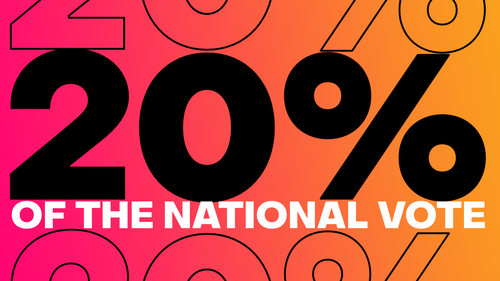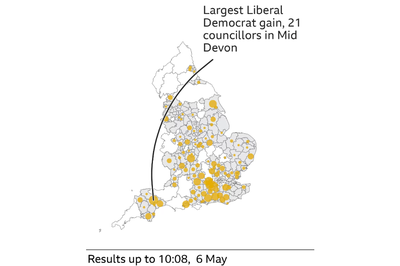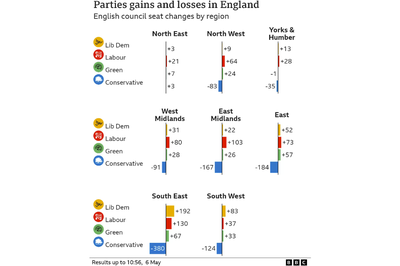Another great success

It’s vital to learn from failures. But it’s much more fun to learn from successes. So there is a lot of fun to be had in learning the lessons for the Liberal Democrats from the latest local elections.
Let’s summarise those successes with three numbers:
- +407 seats - the party’s second biggest gain in raw seats since the mid-1990s.
- +12 councils - taking the number of Lib Dem majority councils to its highest for at least 18 years.
- 20% equivalent national share - the highest on this BBC measure since going into coalition in 2010. (The alternative NEV measure was the joint best since 2010.)
However, it’s important to remember that not everyone who hoped to win did so. For colleagues who were seeking election but didn’t make it, it can be even tougher when all around people are celebrating. If you, or someone close to you, is in that position, my commiserations and thanks for all you’ve done.
Five in a row
Perhaps the most important element of the local election results is one that has been mostly overlooked. It’s that the Lib Dems have now made it five rounds of local elections in a row at which we’ve made net gains. You have to go back to 2002-6 for the last time we did that.
Another way of looking at our progress is the cumulative gains and losses so far in May elections during this Parliament:
- Lib Dems +637
- Greens +416
- Labour +318
- Conservatives -1,309
That’s the sort of sustained progress which has been an important part of the party’s strategy in this Parliament: investing in our grassroots campaigning support, for both stronger and weaker areas, concentrating on target seats at election time but expanding our areas of strength as we do. Sustained grassroots growth is what will make us a successful national party.
The most dramatic progress was against the Conservatives, and as in 2019 once again our vote share did best the more an area had voted Remain. In areas that voted Remain in 2016, our vote share was up nearly 1.5 points on average, though in areas that voted 60% or more Leave in 2016, our vote share was down just under a point.
But in addition, many groups primarily up against Labour managed to grow, including us becoming the official opposition on Sunderland Council.
Overall, in the places with zero or one Lib Dem council seat up for election this time, we made a net 21 gains, going from 32 councillors in these councils to 53. Four times as many of these smaller places went forward as went back and we went up in every region.


Behind those numbers are all sorts of individual stories, including Syed Yusef, the first Muslim councillor in North Devon council, Kate Smith, the first-ever Lib Dem borough councillor on Amber Valley, and Chris Northwood winning in Manchester.
Plus of course behind every winning candidate is a winning agent and many winning helpers. Thank you one and all.
It also looks like we’ll go from zero to at least two Liberal Democrat council leaders from ethnic minority backgrounds - an important step forward for us.
What lessons can we learn from these successes? Off the back of initial number crunching and what we saw during the campaign - I’m glad to say that my visits around the country were more successful than Conservative Party chair Greg Hands’s visits - it’s possible to start drawing out some lessons.
Our capacity has grown
The local elections saw a welcome big step-up in the number of Liberal Democrat candidates, and we hit new highs for our volumes of canvassing (important in its own right and as an indicator of broader local campaign activity).
But our opportunities exceed our capacity
More candidates, more canvassing and more campaigning helped with our gains. But equally, it’s a common picture around the country that we could have won even more seats if we’d had the capacity to go for them.
Which brings lesson #1: the importance of building-up our campaign capacity, especially in going out to recruit new would-be candidates and in building up local delivery and canvassing teams. The places that were most successful were good not only at getting their own members involved but also in reaching out more widely in their communities too.
The best way to do that comes in lesson #2: the earlier people started on their campaigns, the better they did. The old rule of thumb is that for a May election, one leaflet before Christmas is worth two after. That’s even more true of recruiting more members, possible candidates and helpers.
The best messages are the three-pointers
There are three audiences for political messages - the public, who are the jury that cast their verdict at election time, the media, who are often an important way for voters to hear our messages, and our members, who need to be enthused about our purpose.
Which brings up to lesson #3: the most effective messages were the three-pointers: based on what voters said mattered most to them, made interesting for the media and rooted in our values.
It’s why sewage being dumped in our rivers and on our beaches, for example, was such a powerful message. Voters care about it, the media loves writing stories about it and members are fired up by it.
We spend too much time (poorly) reinventing the wheel
Templates, templates, templates. There are lots of high quality literature templates available, based on what’s worked in winning campaigns. You don’t need to artwork your own canvass leaflet, design your own direct mail or create your own social media look. There are templates available already, from Lib Dem HQ and ALDC, that cover all these tasks and many more.
These templates are more widely used than they used to be, but there’s still an awful lot of time and effort going into reinventing the wheel by creating new things from scratch. Which at best is a poor use of resources, and sadly is not infrequently worse than that - because the reinvented wheels are often not very round.
Lesson #4 then: don’t waste time trying to reinvent the wheel; use templates instead.
Casework wins elections
One skill I’ve tried to hone is picking up the right signals from a local party visit about how well things are really going. Looking at the notes in MiniVAN while waiting for someone to answer the door, for example, is a good insight into how much campaigning in-between elections really goes on. One set of signals I’ve grown to increasingly rely on is the signs of active casework - the more local casework stories in a leaflet, the better things are going.
The old-school approach of winning a ward by first doing a residents survey to find the casework, then doing the casework, then repeatedly reporting back on the casework via letterboxes, fell out of fashion for a long while due to Coalition and then Brexit. But it’s still highly valuable.
Which brings us to lesson #5: we do best where our councillors/candidates are in a regular cycle of surveying, casework and reporting back.
Bring on 2024…
If you thought this year was bad for the Conservatives, remember that this time they were defending a previously poor set of results and the elections this May were in parts of the country that were more Leave-voting than average.
Next year, however, the Conservatives are defending not a poor set of results but a good set of results. So they have much further to fall…
Got any other lessons to add to this list? Or have questions on any of this, or other party matters? Then please drop me a line on president@libdems.org.uk. Do also get in touch if you’d like to invite me to do a Zoom call with your local party or party body